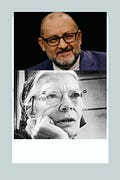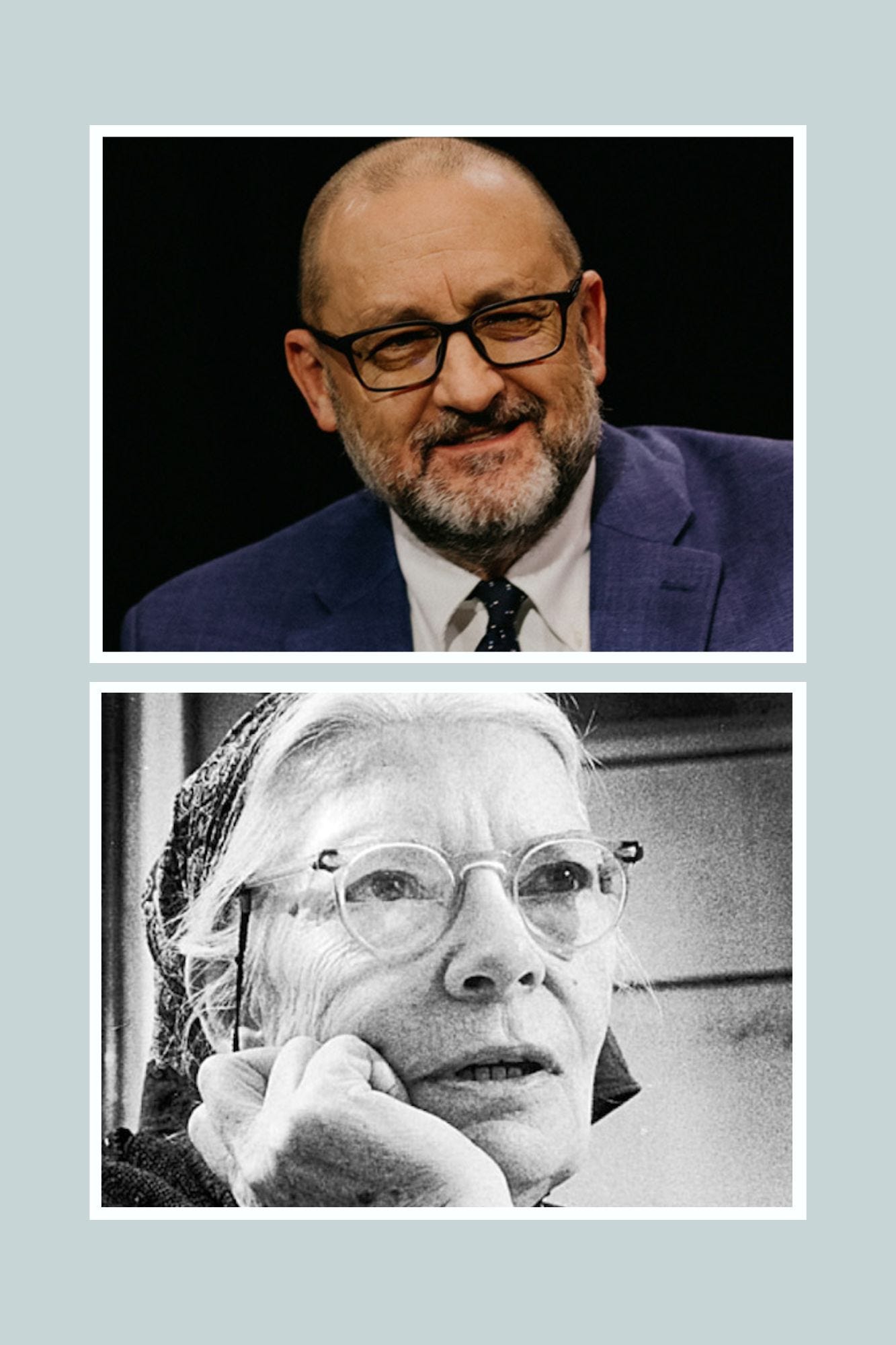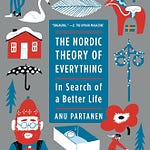“What we would like to do is change the world--make it a little simpler for people to feed, clothe, and shelter themselves as God intended them to do. And, by fighting for better conditions, by crying out unceasingly for the rights of the workers, the poor, of the destitute--the rights of the worthy and the unworthy poor, in other words--we can, to a certain extent, change the world; we can work for the oasis, the little cell of joy and peace in a harried world. We can throw our pebble in the pond and be confident that its ever widening circle will reach around the world. We repeat, there is nothing we can do but love, and, dear God, please enlarge our hearts to love each other, to love our neighbor, to love our enemy as our friend.”
― Dorothy Day
Today on the podcast, I’m joined by Dr. Larry Chapp - former professor and current popular blogger, writer, theologian and founder of the Dorothy Day Catholic Worker Farm - to learn more about Dorothy Day. We discuss her radical politics, her orthodox faith, and what she has to offer a world so at odds with itself. Dorothy Day saw her politics, and her love for the poor, as completely inseparable from her Christian faith - it informed everything she did and everything she stood for.
We speak about how to return to a truly 'lived' Christianity, even when it makes us a bit 'weird.' What is the role of money? How much should we even have materially speaking? Is there a deep tension in serving the poor and also being a responsible parent? All this plus a practical discussion on how we can help others and follow Christ's foundational commandment to always care for those in need.
I absolutely loved the chance to talk with Dr. Chapp. He is no-nonsense, wicked smart, and truly trying to live out his Catholic faith, something I deeply admire. I actually conducted this interview last summer but for various reasons kept waiting for the perfect time to release it. Well, time’s up! It’s now! I think you’ll really enjoy the chat and hopefully be challenged a bit yourself to think how we all can live more radically open and charitable lives.
Here are some highlights from Dr. Chapp taken from our conversation…
On contextualizing Day’s sympathies with communism
She was clearly aware that totalitarianism is a bad thing. She hated Stalin. She despised oppression in all of its forms. She was not in any way, shape, or form a communist in that regard. And so one does have to peel back the layers of rhetoric and understand why is it she was sympathetic to it? And it was because she really did believe passionately that there was something profoundly wrong with the American economic system, with the economic system of the West.
Yes it generates an enormous amount of wealth. There's no doubt about that. Capitalism has generated an enormous amount of wealth and even a certain generalized prosperity, but at the same time, it has generated great corruption in our government and the collusion of the military industrial complex, corporate America, now these days big tech surveillance, and the ever growing power of the centralized state.
And she understood the great potential for harm and oppression that this represented. She also understood, as a Catholic, the degradation to the human soul that this kind of focus on wealth and bourgeois comforts and what that sort of thing does to us.
On the crisis in Catholic education
I began to realize this as a teacher of social justice and Catholic theology in general, that there was this great need to build these little small Catholic communities. […] I'd done my bit for teaching for 20 years. I love teaching, I love the students, but the university world had become corrupt.
In my view, and it was a Catholic school, and yet all we did was chase the market and chase the latest trends, chase the latest boutique majors. We talk a good line as a school about Catholicism and social justice, but then really when you'd get into meetings on an organizational level, you began to realize that all they cared about was, number one, survival. We have to survive somehow as a school. And number two, money. How do we make money? How do we attract more students?
And they didn't care. The Catholicism had to take a way, way back seat to all of those antecedent questions. And then the bureaucracy and the layers of bureaucracy and the kowtowing to the various accrediting agencies. There's a deep crisis in modern day Catholic higher education as there's a crisis in higher education in general.
On fellowship, lost skills, and what happens on the farm
Catholic worker farms should be places where lost skills, lost artisanal skills, are recovered. And so one of one of our focuses now is we're we bring people here to teach them how to do things, like shear a sheep, or even raise a sheep, and to spin wool, and to knit things. We teach them how to do things like can tomatoes, can potatoes. We also have chickens for laying eggs, so we teach them how to take care of chickens, and then how to milk a dairy goat, and what's the best way to preserve and what do you do with the goat milk and so on. And then just teaching people the general skills of animal husbandry on a small scale that people can do in a small scale way themselves, in a way that's been lost.
And then, of course, there is the what Peter Maurin called roundtable discussions. We have a chapel on our area and our farm. It has the Eucharist reserved. We are actually Benedictine Oblates, as Dorothy Day was. And sometimes the groups that come here bring a priest, they say Mass in our chapel, we do Liturgy of the Hours, then we follow with a big meal, and then we sit around and we discuss the church today, culture today, family life, theology, Dorothy Day, Christ, the Gospels. […]
That's that's what we do here. It doesn't sound grandiose, it's pretty simple, but that's what we do.
On the Christian call to material simplicity
You try to live a life as materially simple as you possibly can. It is part of the Catholic Worker ethos and Dorothy Day's ethos going all the way back to the church fathers - you need to live as simple a material existence as you can, as befits your station in life.
And no Christian should really be super wealthy, super rich, unless they're doing something with that wealth to aid the poor, and so on. And so we need to constantly, even as we move away from, say, street ministry and those kinds of things. If I get married, to keep in mind that maybe I don't need two brand new cars, and maybe I don't need a house with six bedrooms, even though I only have two kids, etc. You know what I'm talking about here.
I'm one of five children in my family and I grew up in a tiny little cracker box of a house in Lincoln, Nebraska. My dad was just a fireman, didn't make a whole lot of money. My mom's a stay at home mom. In other words, they could have afforded a bigger house if they'd have had fewer kids, but they opted for children in a small house rather than two kids in a huge house. And so the fewer kids you have, the bigger house you can afford. But why do you need the big house if you only have two kids? So it goes. Now, I'm not condemning people with small families. I only have one child myself, so I don't want to be a hypocrite.
But nevertheless, this is the point that you're bringing up and raising here […] that it's important for us always as Christians to keep in view this simplicity of life.
"release the hounds!”
Catholicism is a beautiful religion with a 2, 000 year tradition of mysticism and holiness and saints and people like St. Francis of Assisi and Mother Teresa. We have a deep well from which to draw, and we need to start drawing from it more. And this is another one of Dorothy Day's points.
Peter Maurin called it - we need to ‘explode the dynamite of the church.’ We've been hiding. Like Christ said, don't put your light under a bushel basket. That's what Peter Maurin was saying when he said we need to ignite the dynamite of the church. There's so many great things in this church.
Let's release the hounds. Let's do it. Let's get out there with our best foot forward!
If you’d prefer to listen to this podcast elsewhere, just look up Born of Wonder on iTunes, Spotify, Podbean, wherever you download your podcasts!
This podcast is free for you to listen to but took time, energy, and research to record, edit, and create. Please consider upgrading to a paid subscription to support the work I do.
Join me and
in Ireland this October 2024 for true fellowship and camaraderie, as we explore the saint-scattered hills of the Emerald Isle. We’ll be hiking St. Patrick’s Holy Mountain, visiting the Rock of Cashel, praying at our Lady of Knock, drinking whiskey at the oldest distillery in the world, toasting on literary pub crawls, having High Tea at a castle, seeing the Book of Kells and Trinity Library, jigging to fiddle music, and most importantly living a real joyful embodied life.Come with us!
Download the brochure / Commonly asked questions / Sign up!
“Pilgrimage is a symbol of life. It makes us think of life as walking, as a path. If a person does not walk, but instead stays still, this is not useful; it accomplishes nothing. Think of water: when water is not in the river, it does not course, but instead it remains still and stagnates. A soul that does not walk in life doing good, doing many things that one must do for society, to assist others, or who does not walk through life seeking God and inspiration from the Holy Spirit, is a soul that finishes in mediocrity and in spiritual poverty.
Please: do not stand still in life!”
— Pope Francis















Dr. Larry Chapp on Dorothy Day and Re-Weirding Christianity